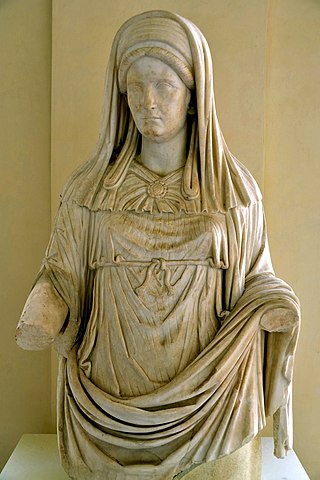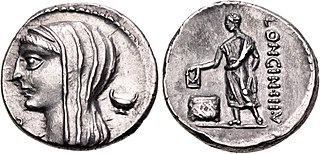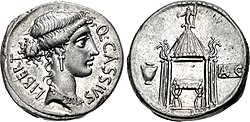This article concerns the period 69 BC – 60 BC.

In ancient Rome, the Vestal Virgins or Vestals were priestesses of Vesta, virgin goddess of Rome's sacred hearth and its flame.
Marcus Aemilius Scaurus was a Roman statesman who served as consul in 115 BC. He was also a long-standing princeps senatus, occupying the post from 115 until his death in late 89 or early 88 BC, and as such was widely considered one of the most prestigious and influential politicians of the late Republic.

The gens Aemilia, originally written Aimilia, was one of the greatest patrician families at ancient Rome. The gens was of great antiquity, and claimed descent from Numa Pompilius, the second King of Rome. Its members held the highest offices of the state, from the early decades of the Republic to imperial times. The Aemilii were almost certainly one of the gentes maiores, the most important of the patrician families. Their name was associated with three major roads, an administrative region of Italy, and the Basilica Aemilia at Rome.
Lucius Marcius Philippus was a politician and senator in the late Roman republic. He was governor of Syria from 61 to 60 and later served in the consulship of 56 BC. He was also step-father of the emperor Augustus.
Lucius Licinius Crassus was a Roman orator and statesman who was a Roman consul and censor and who is also one of the main speakers in Cicero's dramatic dialogue on the art of oratory De Oratore, set just before Crassus' death in 91 BC. He was considered the greatest orator of his day by his pupil Cicero.
Quintus Mucius Scaevola "Pontifex" was a politician of the Roman Republic and an important early authority on Roman law. He is credited with founding the study of law as a systematic discipline. He was elected Pontifex Maximus, as had been his father and uncle before him. He was the first Roman Pontifex Maximus to be murdered publicly, in Rome in the temple of the Vestal Virgins, signifying a breakdown of historical norms and religious taboos in the Republic.
Lucius Cassius Longinus Ravilla was a Roman politician. He served as consul in 127 BC and censor at the following lustrum in 125 BC.

The gens Marcia, occasionally written Martia, was one of the oldest and noblest houses at ancient Rome. They claimed descent from the second and fourth Roman Kings, and the first of the Marcii appearing in the history of the Republic would seem to have been patrician; but all of the families of the Marcii known in the later Republic were plebeian. The first to obtain the consulship was Gaius Marcius Rutilus in 357 BC, only a few years after the passage of the lex Licinia Sextia opened this office to the plebeians.

Gaius Porcius Cato was a Roman politician and general, notably consul in 114 BC. He was the son of Marcus Porcius Cato Licinianus and grandson of Cato the Censor.
Marcus Terentius Varro Lucullus, younger brother of the more famous Lucius Licinius Lucullus, was a supporter of Lucius Cornelius Sulla and consul of ancient Rome in 73 BC. As proconsul of Macedonia in 72 BC, he defeated the Bessi in Thrace and advanced to the Danube and the west coast of the Black Sea. In addition, he was marginally involved in the Third Servile War.
Licinia is the name used by ancient Roman women of the gens Licinia.
Quintus Caecilius Metellus Celer was a Roman politician who was consul in 60 BC and in the next year opposed Pompey, Caesar, and the so-called First Triumvirate's political programme. He was a member of the powerful and influential plebeian noble family, the Caecilii Metelli. Prior to 62 BC, he was an ally of Pompey and had served as urban praetor in 63, augur by 63 BC, possibly aedile in 67 BC, and plebeian tribune in either 72 or 68 BC.
Lucius Caecilius Metellus Delmaticus was a Roman politician and general. He was a son of Lucius Caecilius Metellus Calvus and brother of Quintus Caecilius Metellus Numidicus. He was consul in 119 BC; during his year, he opposed Gaius Marius' election procedures law. As consul and proconsul from 119–117 BC, he campaigned against the Dalmatians. For his victories, he triumphed in 117 BC, earning his cognomen and dedicating two temples – also contributing to repairs for the Temple of Castor and Pollux – from the spoils of war.

Lucius Cassius Longinus was the brother of the Gaius Cassius Longinus, a leading instigator in the assassination of Julius Caesar.

The gens Fonteia was a plebeian family at ancient Rome. Members of this gens are first mentioned toward the end of the third century BC; Titus Fonteius was a legate of Publius Cornelius Scipio during the Second Punic War. The first of the Fonteii to obtain the consulship was Gaius Fonteius Capito, consul suffectus in 33 BC.







